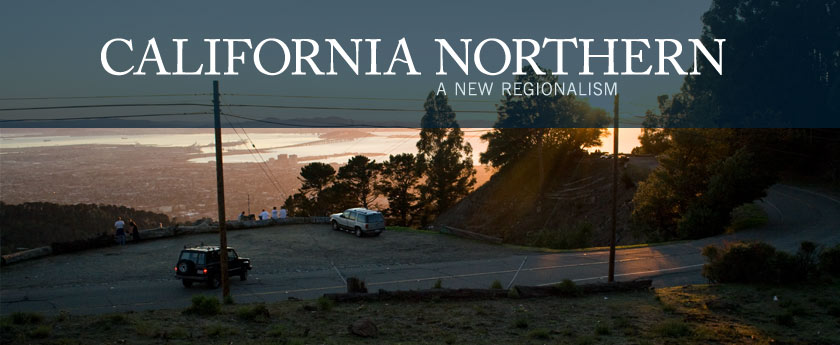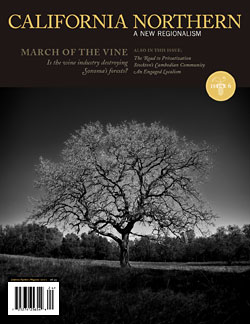Regionalism in the Western Dissolve
By Richard Mills
Through a family connection, my girlfriend has access to a mobile home, one of about thirty in a trailer park that sits on a cliff overlooking the Capitola promenade, a few miles south of Santa Cruz. The mobile home itself is humble among the others, its corners chewed by rust and rot, its roof sagging under the soggy coastal air.
For us, the mobile is a vacation hangout, time-shared among her aunts, cousins, and siblings. But there are permanent residents in the park, and the owner of the lot has been trying to oust them for years. He’d like to get rid of the rent control, the low-income-housing designation, and the mobile homes themselves, presumably to start making some scratch off a very well-situated piece of real estate. He seems to be making progress; the tidy mobiles are emptying, though some of the older residents have simply died. The home next to ours appears have suffered such a loss. There are no curtains and no people inside—just a curling poster of San Francisco’s nighttime skyline, stray wicker furniture, a glass-topped table for those calm, golden-years sessions of marathon coffee drinking, all in the shadow of the skeletal cypress outside.
Across the way is a single man in his forties with surfboards propped against his well-kept mobile. Occasionally his teenage kids visit. They play awkward games of basketball with their dad in the short driveway, then cut loose to scream, run, text in some corner of the lot. But usually the man sits on the porch alone and holds long conversations on his cordless—sometimes tense, sometimes ruminative. He has a lot of catching up to do with a lot of people.
Whenever we arrive for a stay, he glares at us, and once as we unloaded our car not ten feet from him, he shouted into the phone, “WELL, RIGHT NOW I’M STARING AT A PIECE-OF-SHIT EYE-SORE.”—that is, our mobile. It’s a moment that has stuck with me. I had thought that we were in the same boat—natural allies—both sympathetic to the situation of being less than rich, so I struggled to make sense of the hostility. We were both in a trailer park, after all. At first I thought he was just protecting and asserting the dignity of his neighborhood, boorishly warning us against dragging it down.
But there was something else going on. He was now the one calling our home a piece of shit, after his home, his life, had been effectively called that by people with more power than him, who were trying to sweep it aside to replace it with something deemed more valuable. So his treatment of us might’ve dulled that powerful sting. In the back of his mind, knowing he was subject to the cold power of the market, perhaps he wanted to mimic that power in the small setting before him. He wanted to touch, taste, and be the thing that was looming powerfully but ineffably.
I was struck most of all by how, in doing so, he provided a striking, oddly Californian fusion of opposites, a capacity to embrace and embody that which had assaulted and opposed him. Tanned, bare-footed, scowling, relaxed in the shoulders, baldly superior—he channeled both vagabond and real-estate developer, both the blithe freedom associated with our coast as well as its economic stratification, as though he’d be equally at home on a bender with Steinbeck’s paisanos and rolling scotch over his tongue between whispered deal-making at some secret San Francisco men’s club.
This is an excerpt of “Regionalism in the Western Dissolve”

